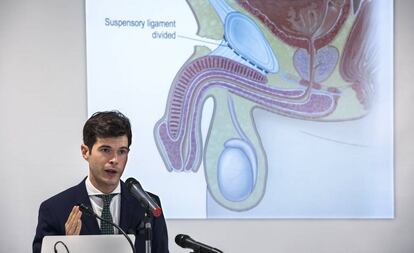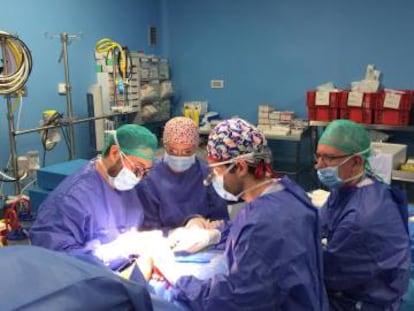Valencia doctor performs pioneering sex change surgery in 17 hours
The Spanish medical team created a man’s body, a process than can take up to 10 years, in under a day

A Spanish medical team led by the surgeon César Noval has performed a pioneering sex reassignment surgery in 17 hours at Imed, a private hospital in Valencia. Compressing a process that can take between two and 10 years in Spain to under one day, the team constructed a penis (phalloplasty), removed the patient’s internal female organs and breasts, and gave him a more masculine face, Noval explained on Tuesday.
The advantage of doing everything at once is that patients don’t have to spend years with their lives on hold
Surgeon César Noval
The patient, a 29-year-old trans man who lives in a small town in the Valencia region, was operated on two months ago and has recovered well from the surgery. His life has almost completely returned to normal, although the surgeon admits that his sexual life is still limited.
During the operation, the patient had his breasts removed and chest redefined. A penis was implanted using skin, fat, nerves, arteries and veins from the patient’s forearm, which was covered with a skin graft from his thigh. His face was made squarer and his nose widened to make him look more masculine. “The main advantage of doing everything at once is that patients don’t have to spend years with their lives on hold waiting for the next operation,” said Noval.
Under the public health system, the three main surgeries required for a sex reassignment (facial plastic surgery is not offered) can take between eight and 10 years, because the operations are performed by different services, says Mané Fernández, vice president of the national LGBTI Federation, who is also a trans man. The waiting time however is shorter in regions where health regulations respect the needs of LGBTI people. “That’s why it’s important to legislate on a national level and to approve the LGBTI Equality Law that is now being reviewed by parliament,” explains Fernández.

Under the private health system, around two years are needed for the four surgeries because at least six months usually pass between operations, said Noval, who learned how to shorten the process to one surgery in the United States. The surgeon did not want to say how much the patient had paid for the operation but admitted it was more than €20,000.
To go through this type of surgery, a patient must be in good physical and psychological health and have social and family support, said Noval. In this case, the patient had spent 15 years living fully as a man and three years using hormone treatment. He has been in a stable relationship for the past 10 years and both his wife and family offered him “spectacular support,” said Noval.
Complications
Sex reassignment surgery involves many risks. The most severe tend to appear in the first 48 hours. The surgeon warned that only 60% achieve feeling in the penis, while 30% suffer complete or partial loss of the member. The risk of breast cancer increases despite the mastectomies, due to the hormone treatment. And a prosthesis must typically be placed in the new penis, although in this case it does not appear to have been necessary.
The 29-year-old patient is recovering well from the operation
Around 15 phalloplasties are performed each year in Spain – far fewer than the number of vaginoplasties (the sex reassignment operation for trans women), which is around 100 a year. Fernández says the low number of phalloplasties is due to the fact the operation not only has a high level of risk, it also often fails to meet the patient’s expectations.
The surgery is irreversible. In the very few cases where patients have wanted to return to their previous state (0.6%), the outcome has not been good. Noval advises patients and their families to reach out to LGBTI associations and meet people who have gone through the process. He also says it is a good idea for people considering a sex change to spend a period beforehand living “in the body they feel, and when they feel comfortable, we can continue.”
“It can’t be done without support”
As well as speaking with LGBTI associations, the support of family and close social circles is crucial, says Noval. “Without this support, we can’t operate. And it’s very hard to tell a patient who wants the operation that you are not going to operate because they need it for their personal development.”
The medical team in Valencia was divided into two and took turns performing the operation. The complete process involved a plastic surgeon, a maxillofacial surgeon, an endocrinologist, a gynecologist, a urologist and a psychologist.
English version by Melissa Kitson.
Tu suscripción se está usando en otro dispositivo
¿Quieres añadir otro usuario a tu suscripción?
Si continúas leyendo en este dispositivo, no se podrá leer en el otro.
FlechaTu suscripción se está usando en otro dispositivo y solo puedes acceder a EL PAÍS desde un dispositivo a la vez.
Si quieres compartir tu cuenta, cambia tu suscripción a la modalidad Premium, así podrás añadir otro usuario. Cada uno accederá con su propia cuenta de email, lo que os permitirá personalizar vuestra experiencia en EL PAÍS.
¿Tienes una suscripción de empresa? Accede aquí para contratar más cuentas.
En el caso de no saber quién está usando tu cuenta, te recomendamos cambiar tu contraseña aquí.
Si decides continuar compartiendo tu cuenta, este mensaje se mostrará en tu dispositivo y en el de la otra persona que está usando tu cuenta de forma indefinida, afectando a tu experiencia de lectura. Puedes consultar aquí los términos y condiciones de la suscripción digital.









































